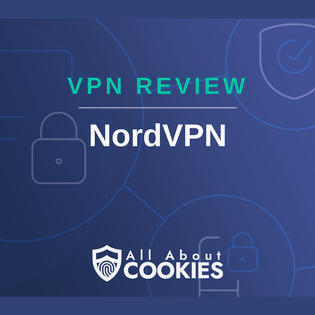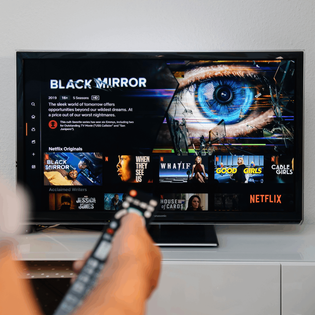-
Unlocks Netflix and BBC iPlayer
-
Budget-friendly and accepts bitcoin payments
-
Limited number of servers
Advertiser Disclosure
All About Cookies is an independent, advertising-supported website. Some of the offers that appear on this site are from third-party advertisers from which All About Cookies receives compensation. This compensation may impact how and where products appear on this site (including, for example, the order in which they appear).
All About Cookies does not include all financial or credit offers that might be available to consumers nor do we include all companies or all available products. Information is accurate as of the publishing date and has not been provided or endorsed by the advertiser.
Editorial Policy
The All About Cookies editorial team strives to provide accurate, in-depth information and reviews to help you, our reader, make online privacy decisions with confidence. Here's what you can expect from us:
- All About Cookies makes money when you click the links on our site to some of the products and offers that we mention. These partnerships do not influence our opinions or recommendations. Read more about how we make money.
- Partners are not able to review or request changes to our content except for compliance reasons.
- We aim to make sure everything on our site is up-to-date and accurate as of the publishing date, but we cannot guarantee we haven't missed something. It's your responsibility to double-check all information before making any decision. If you spot something that looks wrong, please let us know.
If you’re looking for a virtual private network (VPN) that balances cost, performance, and usability, then PrivateVPN is for you. This service offers a wide array of features, from OpenVPN and Wireguard protocols to a strict no-logs policy.
In this PrivateVPN review, we'll break down everything from its security features to whether it unblocks Netflix based on our extensive testing and analysis.
Who is PrivateVPN best for?
PrivateVPN features
Our experience with PrivateVPN
PrivateVPN test results
PrivateVPN compatibility
PrivateVPN customer support
PrivateVPN prices and subscriptions
PrivateVPN alternatives
PrivateVPN FAQs
Bottom line: Is PrivateVPN good?
PrivateVPN review at a glance
| Price | $2.00–$9.90/mo |
| Free version | No |
| # of simultaneous connections | 10 |
| Number of servers | 200+ servers in 63 countries |
| VPN protocol | OpenVPN UDP, OpenVPN TCP, L2TP VPN and IPsec VPN, Wireguard |
| Encryption | AES-256-bit encryption |
| No-logs policy | No logs |
| Headquarters | Sweden |
| Netflix access | Yes |
| Learn more | Get PrivateVPN |
Who is PrivateVPN best for?
- Recommended for individuals who want strong privacy features without sacrificing ease of use
PrivateVPN is perfect for anyone who values the ability to unblock geo-restricted content. This includes popular streaming platforms such as Netflix, Disney+, and BBC iPlayer. The company also has a strict no-logs policy and is based in Sweden. This is particularly attractive to those concerned about privacy, as Sweden has stringent privacy laws.

PrivateVPN supports multiple VPN protocols, including OpenVPN UDP, OpenVPN TCP, L2TP, IPsec, and Wireguard. It’s a great choice for both newcomers and tech-savvy users. It also allows you to connect up to 10 devices simultaneously, which makes it a great choice for people who have a lot of devices or for large households.
The ability to pay with bitcoin also adds an extra layer of privacy. Especially for those who want to keep their purchases anonymous.
PrivateVPN pros and cons
- Unlocks Netflix and BBC iPlayer
- User-friendly interface
- Accepts bitcoin payments
- Limited number of servers
- No free version available
PrivateVPN features
PrivateVPN comes with a wide range of features that make it a great contender for your next VPN. These include its ability to unblock geo-restricted streaming services while providing a good range of VPN protocols and safety features. However, one aspect where PrivateVPN falls short compared to some of its competitors is its server count.
Server count and countries
- 200+ servers in 63 countries
PrivateVPN offers a network of over 200 servers spread across 63 countries, including Germany, France, the U.K., Mexico, Australia, the U.S., Canada, Japan, Brazil, and South Africa.
While this might not sound as impressive when compared to some other VPN providers boasting thousands of servers, it's still a fairly decent count that offers a good degree of versatility and global coverage.
For comparison, NordVPN has 5,800+ servers in 60 countries and Surfshark has 3,200+ servers in 100 different countries.
The importance of server count and the spread of locations cannot be overstated. A large server count generally means less server load, which can translate into faster speeds. This is especially key if you plan on using your VPN for streaming or torrenting.
Having server locations in multiple countries allows you to bypass any geo-restrictions more effectively. It’s absolutely necessary to have access to a server in the country or region you’re trying to access content from. Let’s say you want to watch a specific TV show that’s only available on the U.K. version of Netflix. To do so, you need to have access to VPN servers within the UK.
Although the PrivateVPN server network is smaller than other VPNs like NordVPN and Surfshark, it does well in providing access to a suitably diverse range of countries. This diversity offers flexibility when it comes to bypassing geo-restrictions and accessing content from around the globe.
However, if you're someone who requires connections to more specific or less popular locations, you might find the limited number of servers a bit restrictive.
No-logs policy and headquarters
- PrivateVPN logs policy: No logs
- PrivateVPN headquarters: Sweden
A no-logs policy is a promise from the VPN provider to not record or store any of your online browsing activities. This means the VPN has no information to provide to a government agency or a third party if it’s requested.
Of course, you’ll need to provide some information to PrivateVPN in order to create an account and pay for your subscription. This may include your email address and credit card number, depending on how you set up your account and choose to pay. However, we’re happy to see that PrivateVPN only shares this information as necessary to provide you with its service. This data is also only stored as long as necessary.
Knowing that no information is stored adds trust in the VPN you’ve decided to use. The no-logs policy ensures that your online data cannot be misused. PrivateVPN's commitment to not keeping logs is a major plus for privacy-conscious users.
The location of a VPN's headquarters is also crucial, as it determines which country's laws the VPN provider is subject to. Sweden, where PrivateVPN is headquartered, is known for its strong privacy protections and is not part of any major international surveillance alliances like the 14 Eyes alliance. This means the government is less likely to request user data — but even if it did, PrivateVPN's no-logs policy means there’s no data to hand over.
Security features
When it comes to security features, PrivateVPN provides the basics. It offers both a kill switch and split tunneling, in addition to multiple VPN protocols.
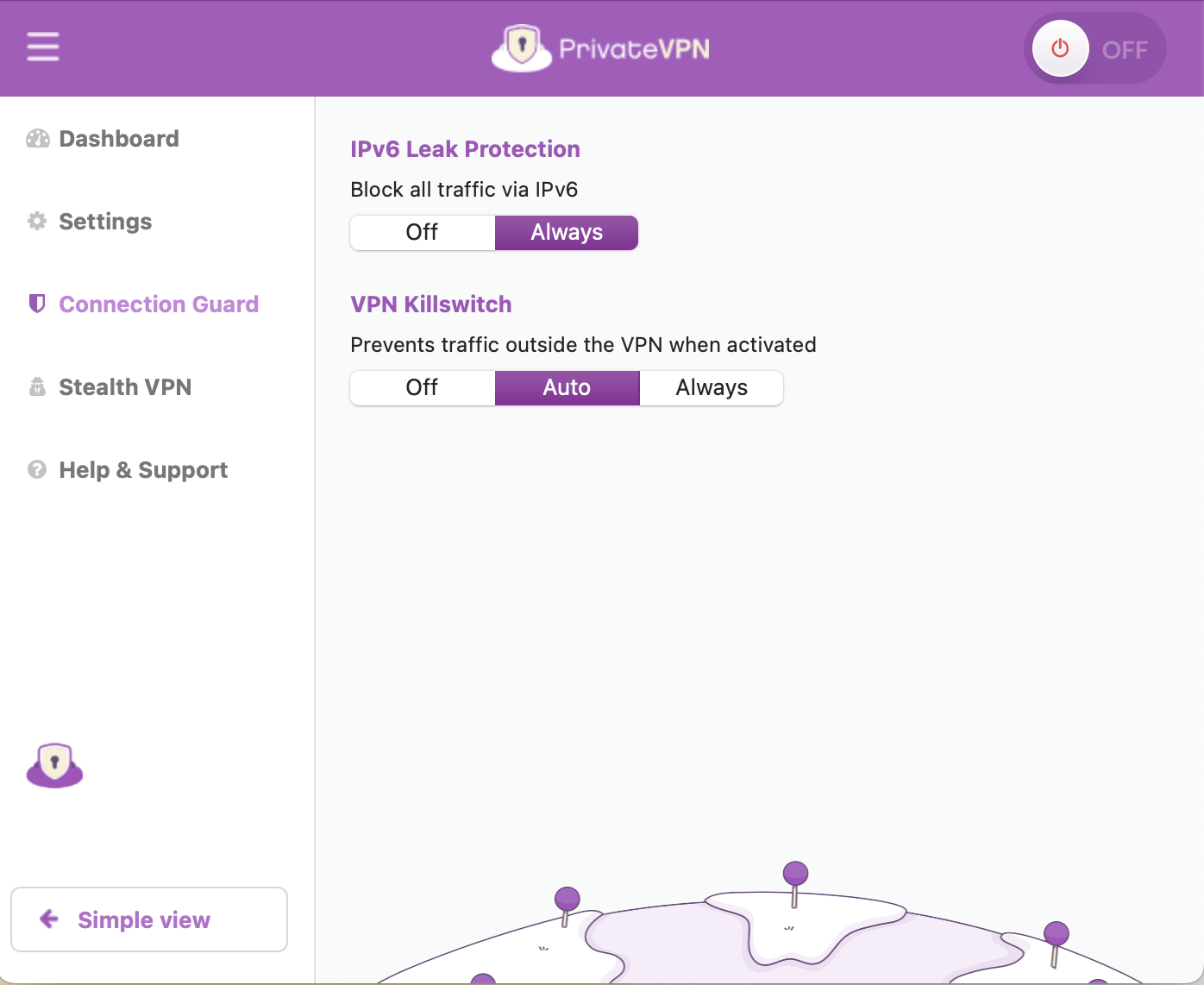
Split tunneling allows you to choose which part of your internet traffic goes through the VPN and which part accesses the internet directly. This means you can protect your sensitive data by routing it through the VPN while accessing local websites as usual. You can easily find and switch this feature on or off in the settings section of the PrivateVPN app.
A kill switch is a safeguarding feature that’s designed to automatically disconnect your device from the internet if your VPN connection drops unexpectedly. This can help prevent your real IP address and other sensitive information from being exposed at the time the VPN connection drops. The PrivateVPN kill switch can be activated in the app’s Connection Guard settings.
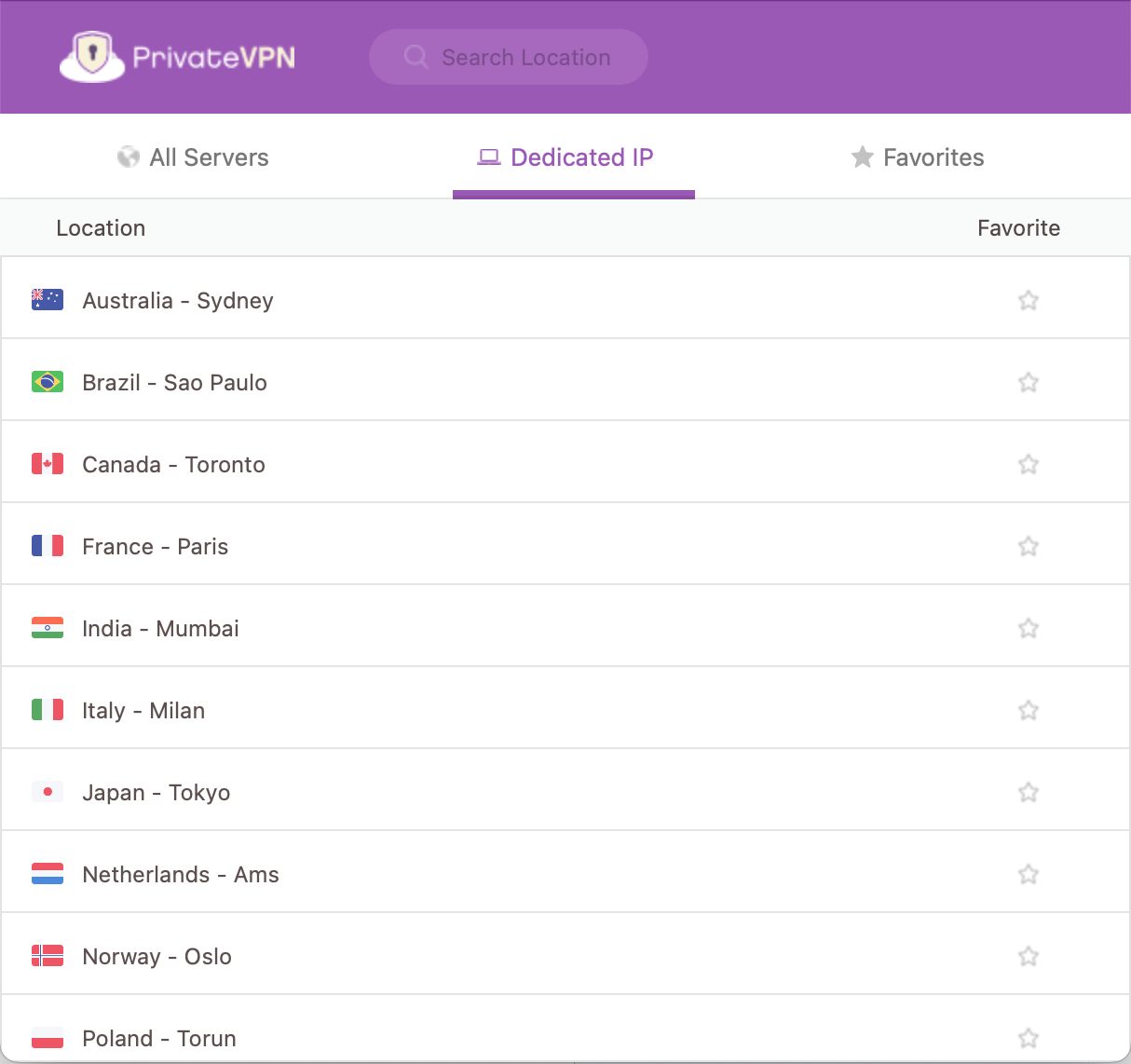
We also like that PrivateVPN offers a number of dedicated IP servers. Many VPN providers charge extra for a dedicated IP, so it’s nice to see this built-in at no additional cost.
PrivateVPN also offers a variety of VPN protocols, including OpenVPN UDP, OpenVPN TCP, L2TP, IPsec, and WireGuard. The choice of protocol depends on whether you prioritize speed or security. For a balance of both, OpenVPN is usually the recommended choice. However, the VPN app can auto-select a protocol if you're unsure which to use.
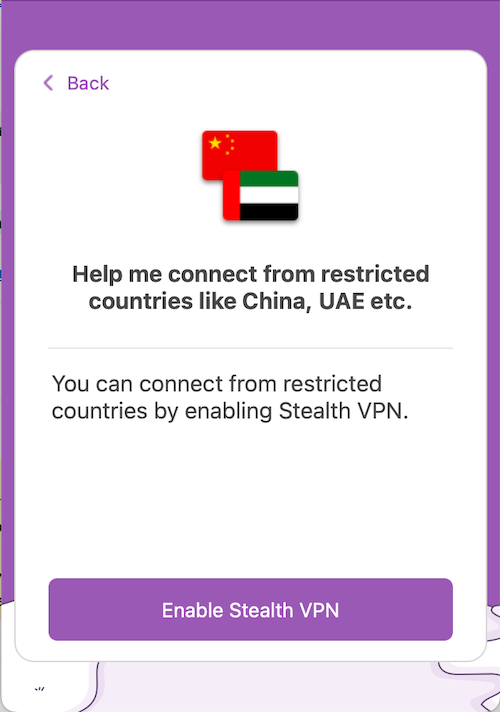
Lastly, you can choose to turn on Stealth VPN, a feature that essentially hides the fact that you’re using a VPN and helps you get around censorship in countries like China and Russia.
Some features that PrivateVPN is missing include:
- Ad blocker and anti-malware tools
- Specialty servers for torrenting and streaming
- Double VPN (also called multi-hop)
If you’re looking for any of these features, check out our guide to the best VPN apps for alternatives.
Our experience with PrivateVPN
The experience of downloading and installing PrivateVPN was straightforward and user-friendly— the process was a breeze. Clear instructions are provided every step of the way, making it easy even for those new to VPNs.
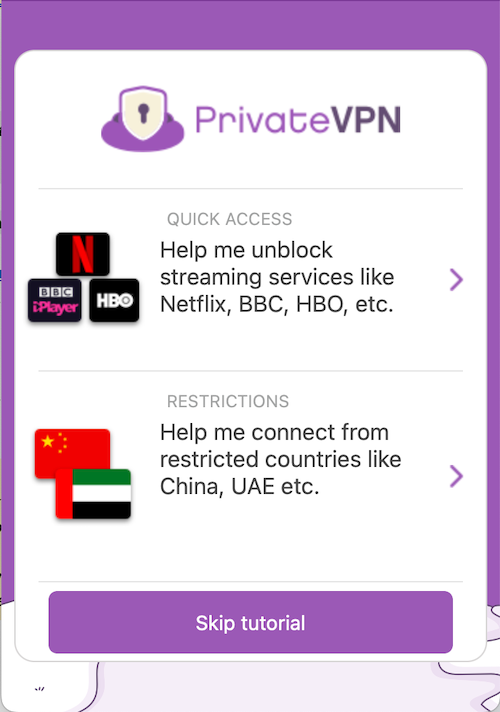
We also like that you can choose between a simple view and an advanced view in the PrivateVPN desktop app. The advanced view reveals more advanced settings such as the kill switch and encryption, but you don’t need to dig through these if you’re a VPN newbie and prefer the simple view.
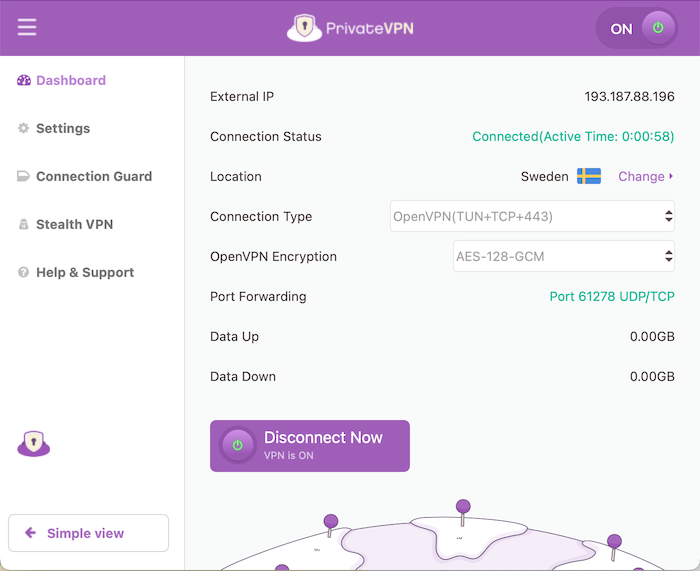
Choosing and connecting to a server was a simple task, thanks to the clearly laid out server list. The VPN connected swiftly without any hitches. Special features, such as the kill switch and split tunneling, were easily accessible in the settings section of the app and were simple to configure.
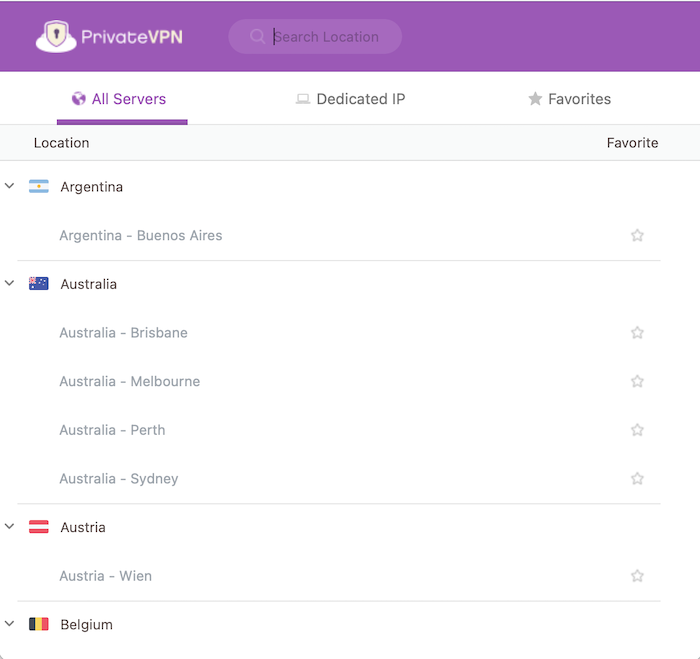
Overall, the experience was smooth, and we encountered no notable issues while we tried PrivateVPN out.
PrivateVPN test results
When testing VPNs, it's crucial to evaluate their impact on internet speed. A great VPN should provide security and privacy features without significantly compromising your connection speed. To assess this, we carried out speed tests with PrivateVPN, both with the VPN turned on and off.
Speed tests
Our testing showed that using PrivateVPN affected our internet speed, but the reduction was within acceptable ranges considering the encryption and routing processes involved. The tests were performed on a Windows device.
To set a baseline, we conducted an initial speed test without the VPN turned on, which showed a download speed of 374.90 Mbps, upload speed of 370.52 Mbps, and latency of 9 ms.
With PrivateVPN turned on and connected to a U.S. server, the download speed dropped to 342.23 Mbps which is a decrease of approximately 8.7%. The upload speed dropped 36% to 237.05 Mbps, and latency increased to 24 ms, an increase of 166.7%.
When connected to the U.K. (EU) server, the download speed decreased by 35.2% and the upload speed by 57.1%. Latency increased significantly to 144 ms.
Using an Australian server, the download speed reduced further to 149.68 Mbps (a 60.1% decrease), and upload speed dropped to 48.77 Mbps (an 86.8% decrease). Latency here was highest at 241 ms (a 2,577.8% increase).
Despite these reductions, it's worth noting that even with the decreases, the speeds were still sufficient for most online activities, including streaming and video calls. However, you should expect some lag or buffering when connected to servers that are far from your physical location.
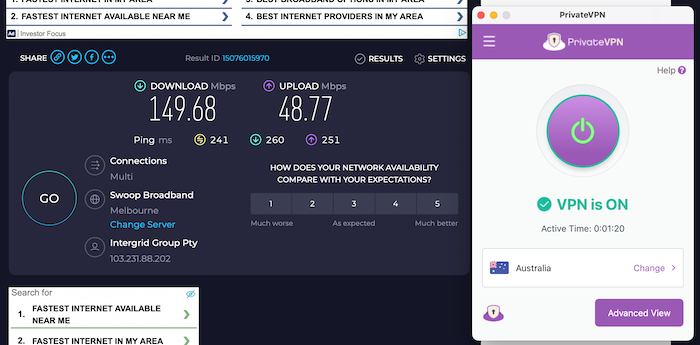
PrivateVPN speed test results
| Test type | No VPN | US to US | US to EU | US to AU |
| Download speed | 374.90 Mbps | 342.23 Mbps | 243.01 Mbps | 149.68 Mbps |
| Upload speed | 370.52 Mbps | 237.05 Mbps | 158.78 Mbps | 48.77 Mbps |
| Latency (ping) | 9 ms | 24 ms | 144 ms | 241 ms |
| Download speed % difference | – | -8.7% | -35.2% | -60.1% |
| Upload speed % difference | – | -36% | -57.1% | -86.8% |
| Latency % difference | – | 166.7% | 1500% | 2577.8% |
PrivateVPN Netflix tests
- PrivateVPN Netflix test results: PrivateVPN unblocked all Netflix libraries.
Our tests showed that PrivateVPN allowed us to access Netflix libraries across different regions. People often turn to VPNs to bypass geo-restrictions imposed by streaming platforms like Netflix and Hulu. This enables them to enjoy content that isn’t available in their region.
In our tests, PrivateVPN proved reliable in unblocking Netflix in the U.S., U.K., Canada, and Australia. It did so without any real issues, including lag or buffering. (The U.K. connection took a while, but it still worked.) This means that no matter where you are in the world, you can use PrivateVPN to access a vast array of Netflix content as well as other streaming services like Disney+ and BBC iPlayer.
It’s important to note that VPN performance varies quite significantly. Therefore, its ability to access Netflix content from different regions will change as Netflix continues its attempts to detect and block VPNs.
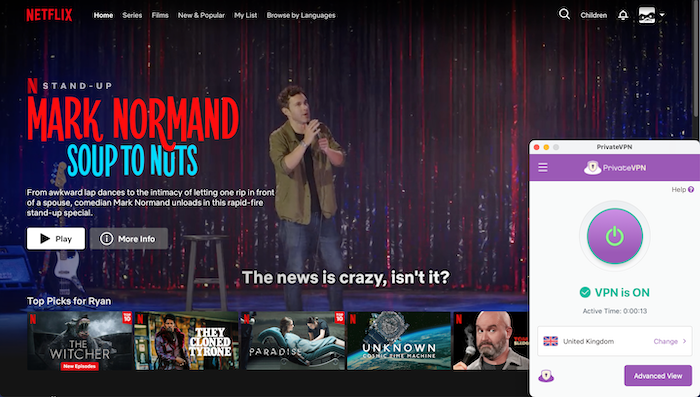
PrivateVPN Netflix test results
| US to US | US to UK | US to Canada | US to AU | |
| Did it work with Netflix? |
DNS and WebRTC leak tests
- PrivateVPN DNS leak test results: No leaks
- PrivateVPN WebRTC leak test results: No leaks
DNS, or Domain Name System, is the protocol that translates website names into IP addresses. A DNS leak occurs when your VPN fails to secure your DNS queries, revealing your internet service provider’s (ISP’s) DNS servers and, consequently, your online activities to your ISP or other third parties. PrivateVPN passed our DNS leak test, which means it has adequate DNS leak protection and maintains your privacy.
Your internet provider may use your internet activity to decide whether to throttle your bandwidth, which slows down your internet speeds. Your ISP may also share your data with government agencies. Lastly, ISPs are also known to sell your online activity data to advertising agencies, allowing the advertisers to then bombard you with targeted ads.
WebRTC is a feature that enables video and voice calls, as well as P2P sharing within a browser. It stands for Web Real-Time Communication. However, WebRTC is prone to IP leaks, even if you’re using a VPN.
A WebRTC leak test checks if your real IP address is exposed while using a VPN. PrivateVPN passed the WebRTC leak test, meaning it successfully masked our IP address, reinforcing its promise of anonymity.
Passing both these tests is essential for a VPN to ensure it maintains your online privacy and security. With these results, PrivateVPN has demonstrated its commitment to providing users with a reliable and secure VPN experience.
PrivateVPN compatibility
PrivateVPN works with a number of devices and platforms and offers dedicated apps for a handful of operating systems and device types. We’d love to see PrivateVPN offer more apps for different devices like smart TVs and routers.
Here's a quick list of device and mobile apps that PrivateVPN provides:
- Windows 7, 8, 8.1, and 10
- macOS X
- iOS (iPhone and iPad)
- Android 4.0 and later
- Linux
- Routers
- Kodi
PrivateVPN customer support
PrivateVPN offers numerous customer support avenues to help you with any issues or questions you may have. There’s also a 24/7 live chat option so you can get real-time assistance whenever you need it.

PrivateVPN also boasts a wealth of online resources. This includes FAQs, setup guides, and a troubleshooting section on their website. These resources are comprehensive and easy to follow, even for VPN newcomers.
During our interaction, we found the customer service representatives to be prompt, friendly, and helpful, ready to clarify doubts and resolve issues effectively. Overall, PrivateVPN's customer support measures up well, meaning you’ll have access to the help you need when you need it.
PrivateVPN prices and subscriptions
PrivateVPN offers several subscription plans catering to different needs and budgets. For the monthly plan, the price stands at $9.90/mo, which is slightly below average compared to other VPN services.
However, long-term PrivateVPN plans offer considerable discounts. The three-month plan costs $6.00/mo, which is billed at $17.99 every three months. Finally, the 36-month plan comes in at an absolute steal at $2.00/mo.
The 36-month plan is highly competitive when compared with other VPN providers. It offers one of the best VPN services when looking at value for money available in today’s market. Even the monthly cost is justified by the range of features and performance on offer.
PrivateVPN cost
| Plan | 1-month plan | 3-month plan | 36-month plan |
| Price per month | $9.90/mo | $6.00/mo | $2.00/mo |
| Price per year | $118.80/yr | $71.96/yr ($17.99 every 3 mos) | $72.00/yr (billed every 12 mos after 36 mos) |
| Learn more | View Plan | View Plan | View Plan |
PrivateVPN alternatives
While PrivateVPN offers a solid VPN service, it's always good to have alternatives in mind. Each VPN service has its own set of strengths and potential drawbacks. Here are three noteworthy alternatives to PrivateVPN, each with its unique features and capabilities.
- CyberGhost: A user-friendly VPN service known for its high speeds and excellent security, CyberGhost has a vast network of 7,000+ servers spread across the globe. This makes it a reliable choice for accessing geo-blocked content and maintaining your online privacy. It supports up to seven simultaneous connections and offers up to a generous 45-day money-back guarantee.
Get CyberGhost | Read CyberGhost Review
- Surfshark: This is another popular VPN that stands out for its unlimited simultaneous connections and competitive pricing. It offers excellent security features such as CleanWeb, an anti-malware and tracker blocker. Coupled with strong performance and easy-to-use apps, this makes Surfshark a great alternative to PrivateVPN.
Get Surfshark | Read Surfshark Review
- Private Internet Access (PIA): A U.S.-based VPN known for its affordable prices and large network of servers, PIA supports unlimited simultaneous connections and offers customizable security settings. This makes it a flexible choice for both beginners and seasoned VPN users.
Get PIA | Read PIA Review
PrivateVPN FAQs
Is PrivateVPN safe to use?
Yes, PrivateVPN is safe to use. It uses strong encryption, has a no-logs policy, and includes features like a kill switch for added security.
Is PrivateVPN good for Netflix?
Yes, PrivateVPN can bypass Netflix's geo-restrictions, enabling you to watch Netflix content from different regions without issues.
Does PrivateVPN have a free trial?
Yes, PrivateVPN offers a 7-day free trial as well as a 30-day money-back guarantee, giving you a risk-free opportunity to test the service.
Does PrivateVPN sell data?
No, PrivateVPN adheres to a strict no-logs policy, which means it doesn't store or sell your data. It’s also headquartered in Sweden, which has strong data protection laws.
Bottom line: Is PrivateVPN good?
PrivateVPN offers a sufficient balance between speed, privacy, and versatility. This plus its low price for the 36-month plan makes it a great solution for a variety of people. On top of this, it performs well with stable connections and successfully unblocks streaming platforms like Netflix.
We especially liked its user-friendly interface, which makes it a great choice for newcomers to the VPN world. Finally, let’s not forget its strict no-logs policy and the fact that it's based in a country known for respecting privacy (Sweden).
However, PrivateVPN unfortunately has fewer servers than most of its competitors. This could limit its functionality in certain situations. The good thing is that PrivateVPN manages these servers well by providing reliable and speedy connections. Even so, if you’re looking for a larger server count or specific VPN features, check out our list of the best VPN services for more recommendations.
Considering the value it provides for the cost, especially with its longer-term plans, PrivateVPN stands out as a good option for those seeking to save money on a VPN and enhance their online privacy, access geo-restricted content, or secure their data. Whether you're a casual browser or a heavy streamer, PrivateVPN is worth considering.
-
Unlocks Netflix and BBC iPlayer
-
Budget-friendly and accepts bitcoin payments
-
Limited number of servers

